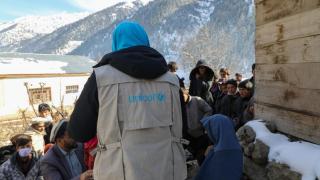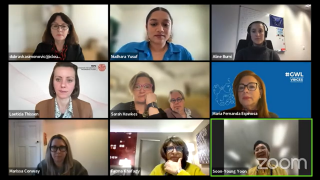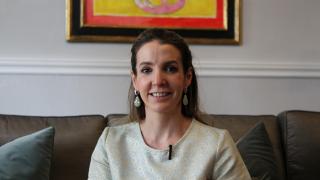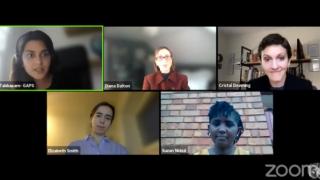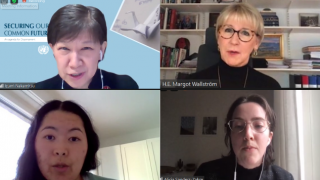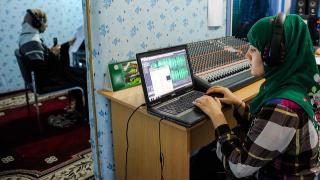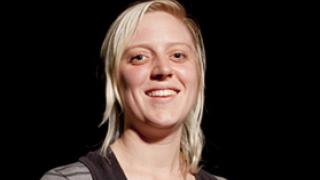
Ahead of the Commission of Status of Women (CSW57) and International Women’s Day - both due in early March, UNA-UK's Nicollen Meek interviewed Charlotte Gage from the Women’s Resource Centre to set the scene for the UN's various gender initiatives.
This interview also ties in with UNA-UK's wider programme of work on gender issues, which includes our February action raising awareness of sexual violence in conflict, and the work of the UNA Women's Advisory Council.
Interview with Charlotte Gage, Policy Officer at the Women's Resource Centre:
In 2011, UNA-UK ran a campaign urging DFID to increase funding to UN Women. Later that year, DFID pledged £20m over two years to the body. These funds have been a great boost to UN Women. But it still faces a significant long-term funding shortfall. Have these financial challenges had an impact on its work?
I, and my colleagues at Women’s Resource Centre, think DFID’s pledge is a testament of the government’s interest in women’s rights.
While the lack of further funding pledged to UN Women is no surprise, considering the deficit and austerity measures, the government has shown it is willing to give more money, and engage further, with the UN departments that they see as more important. It is a shame that they do not appear to see women’s rights as a priority.
To what extent do you feel the UN Millennium Development Goals (MDGs) have ‘delivered’ on gender equality and women’s empowerment to date?
The fact that many of the MDGs did explicitly refer to women was very encouraging.
On the other hand, the Goals are a bit of a ‘red herring’. The UN set out to complete their objectives by 2015 and to say at the end, ‘that’s it. We can tick the box because that’s the end!’ Unfortunately it is never that simple. For example, reducing maternal mortality is much more complex than the MDG targets set out. It is not a health care issue alone; it is bound up with issues around gender equality and the fact that there is no substantive equality for women.
A lot of these goals haven’t actually been met because saying ‘we saved 100 lives’ without addressing the root cause of these problems does not actually change anything in the long term. But people should not see this as failures because changes have happened that have been very important.
Are you hopeful that the post-2015 development agenda will address these root causes?
I think there is potential. UNICEF and UN Women have been doing a call out for papers around women’s inequality, which is supposed to be feeding into the process. However I don’t see how this will translate into actual actions because it ultimately depends on the commitment of the UN's member states.
What is CEDAW and why is it important?
CEDAW is the Convention of the Elimination on all forms of Discrimination Against Women, which the majority of states in the world have signed and ratified (although the US are still absent from the list!). It is unique because it is solely focused on women and uses the concept of 'substantive equality'.
Substantive equality is a certain type of equality. For example: a country will have a law that declares rape illegal. By making rape illegal it can help protect vulnerable women, which is known as 'formal equality' - the type most commonly referred to in international development. However, despite having a law against rape, rape will still occur. A 'substantive equality' approach entails bothhaving that law in place and encouraging positive action to ensure that the act doesn’t happen in the first place. This is what CEDAW believes is the best way to achieve gender equality.
Do you think the UN should do more to lead by example? When do you think we will see the first female Secretary-General?
Because of CEDAW and the UN’s structure I definitely think that there is room for this to happen. But I think it would be interesting if, within the UN, they adopted more effective measures for greater representation.
Michelle Bachelet (Executive Director, UN Women) advocates quotas and talks about how useful they have been internationally. I think it would be great if they could lead by example in terms of promoting those kinds of structures, and the use of temporary special measures, to increase the representation of women within the UN.
It’s only a matter of time until we see a female Secretary General.
What actions can our members take to support gender equality?
The first step anyone can take is to challenge sexism in our day-to-day lives. The Everyday Sexism Project is a good example of this, as it highlights how often women have to deal with discrimination.
Secondly, read the CEDAW blog, re-tweet the tweets and find out about how you can get involved. This whole process is about putting pressure on the government. The UN is an important part of that, but what we’re also doing is creating tools for people to use at work and in everyday life to constantly ask ‘what about CEDAW?’. Hopefully we can create some change by doing that.
Charlotte Gage is Policy Officer at the Women's Resource Centre.

